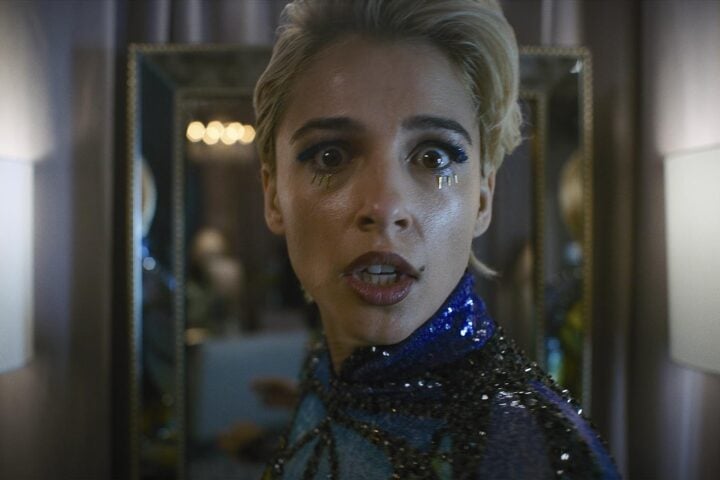“One, never underestimate your opponent. Expect the unexpected. Two, take it outside. Never start anything inside the bar unless it’s absolutely necessary. And three, be nice.” Those words, uttered by Patrick Swayze’s James Dalton in 1989’s Road House, are the rules to defending a roadhouse, and watching Doug Liman’s remake, you may find yourself wishing that someone had told the filmmakers that a little bit of number three goes a long way, because this nihilistic retooling of Rowdy Herrington’s cult classic is anything but.
In the remake, Jake Gyllenhaal’s former MMA fighter Eldwood Dalton scrapes together a living by scamming amateur fighters who, after stepping into an underground ring with him, automatically back down, as they’re familiar with his violent past. Things start to look up for him when he’s sought out by Frankie (Jessica Williams), who offers to put him up in the Florida Keys if he agrees to deal with the people causing trouble at her dingy bar by the water.
Turns out, the gig isn’t all Cuban coffees and breaking up drunken disputes. The titular roadhouse is being targeted by Brandt (Billy Magnussen), a well-connected rich kid in coral suits who’ll do whatever it takes to level the establishment so that he can develop the land it sits on. A budding romance with fiery ER nurse Ellie (Daniela Melchior) and run-in with flamboyant hitman-for-hire Knox (Conor McGregor) complicate things, but nobody in the small burg is ready for the beatdown that Dalton is ready to lay on the bad guys.
Liman is no featherweight when it comes to directing muscular action sequences. Road House immediately and refreshingly sets itself apart from Liman’s most imitated actioner, 2002’s The Bourne Identity, by presenting fights in longer takes rather than cutting them to ribbons. Throughout, the camera never wavers from the action, bobbing and weaving to capture every blow. But as quick bouts become knock-down-drag-out ordeals, any excitement evaporates as it becomes abundantly clear that the well-choreographed match-ups have been accentuated with unfortunate instances of CGI, undercutting the immersion of the action.
Gyllenhaal carries himself with the confident swagger of an action star (complete with applause-worthy defined abs) but a Swayze-esque charmer he is not. Sure, this version of the character immortalized by the late actor is still the type of guy who’ll let you know the exact distance to the nearest hospital (and offer to drive you) before he politely breaks your trigger finger, but don’t expect him to have a conscience. Our hero is no longer a Tai Chi-practicing former philosophy student haunted by the man he killed in self-defense and who approaches every altercation with a sense of gravity. Instead, he’s a man of near-psychopathic determination, in everything from his fits of anger to the lack of concern he shows when feeding a man to a hungry crocodile.
One might think the backbone of any Road House would be those who run a roadhouse, but the filmmakers are less interested in the establishment’s colorful staff than they are in Magnussen’s scarcely compelling Miami Vice-esque villain and his motley crew of goons. (You wouldn’t even know from Anthony Bagarozzi and Chuck Mondry’s script why the joint is worth saving in the first place.) Irish mixed martial artist Conor McGregor is positioned as a scene-stealer in his debut role as demented hitman Knox, but his is a weirdly self-consciously performance that’s caught between being “fun” and “frightening,” and in the end he delivers neither.
Not quite a grim-dark reimagining of a cult favorite, this Road House is still a needlessly un-nice rework that takes the business end of a broken beer bottle to the soul of the original. At one point, a character says, “Shit happens, only here it always happens on a beautiful day,” though you wouldn’t know it from the drab, un-tactile color palette, which keeps everything feeling less like a breath of cool island breeze that it should be than a belch of houseboat exhaust.
Never really embracing James Dalton’s echoed doctrine of “Nobody ever wins a fight,” nor ever really tuning into the slobberknocker B-movie tone that it’s aiming for, Liman’s film is the kind of remake that makes you wonder just what the hell everyone involved saw in the original. Besides, that is, an opportunity to cartoonishly luxuriate in disreputability for its own sake.
Since 2001, we've brought you uncompromising, candid takes on the world of film, music, television, video games, theater, and more. Independently owned and operated publications like Slant have been hit hard in recent years, but we’re committed to keeping our content free and accessible—meaning no paywalls or fees.
If you like what we do, please consider subscribing to our Patreon or making a donation.





